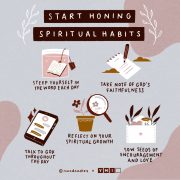After Years of Church-hopping, I Went Back
I must confess: When I first became a Christian, I didn’t like my home church very much.
The church was attached to the primary and secondary school I attended, so it became my church by default. It was through a retreat held by this church that I encountered Jesus Christ and became a believer. It was here that I got plugged into my first discipleship group and youth fellowship.
In my second year of high school, I was baptised and became an official member of the church. By that point I had already been noticing things that I didn’t like. For one, I wasn’t very keen on some elements of the worship service—singing exclusively old hymns; a liturgy that was structured to a tee and created a very solemn, almost grim atmosphere; reciting prayers written centuries ago that sounded not so different from the chanting of other religions. Aside from that, I also sensed a cliquishness among some members, and I thought that the general stand/stance on pop culture was far too restricted—and at times uninformed.
Even though it was a doctrinally correct church and I essentially grew up in it, I felt like I didn’t really fit in. As a result, I mostly kept to myself, sticking with only certain close friends on Sundays.
I spent much of my university years battling a three-year bout of depression. During that period, I was essentially spiritually orphaned, without a discipleship group or leader; it didn’t seem like people had even noticed I had mostly vanished from church activity. Things improved after God lifted me out of my depression. I began attending and even serving in a fellowship for young adults. I also joined a new discipleship group.
But the wounds of the church’s neglect ran deep, and my perceptions of its style hadn’t changed. So I packed my spiritual bags and left.
Seeking greener pastures
I first tried the large evangelical church just across the street from my old church. I liked that I finally got to worship through the kind of contemporary Christian music that I used to only hear at youth fellowship, and I appreciated the looser, more casual, lighter atmosphere. However, even though it was the church attended by my best friend and the people were friendly enough, it felt too big for me and I wasn’t quite at home, so I moved on.
At the time, my parents and brother were attending a much smaller evangelical church pastored by my dad’s friend, whose sons were my brother’s closest friends. It was the kind of church where everyone knew each other and their dog. The atmosphere was very intimate, familial, and generally pleasant, and the people were passionate about the Lord. For a while, it felt like maybe this was a church I could settle down in.
But I still didn’t, and when my brother decided to move on to a well-known megachurch, I followed him. My excuse was, driving to church together would be the perfect opportunity for my brother to coach me since I was just learning how to drive at the time.
In this megachurch, it felt like the Holy Spirit was very much alive and at work—I would hear wonderful testimonies of Jesus’s work in everyday people’s lives, delivering them from alcoholism, lust, anger, materialism. The sermons were striking, and the worship powerful. Once more, I got the sense that maybe I could settle down here.
But it was, once again, too big for me. It was a wonderful church, but it didn’t have the sense of community I was looking for.
To my surprise, I found myself thinking about my original church more and more as time passed. After listening to contemporary songs for years, I now found myself appreciating the old hymns, which I came to realise were beautiful in how they were more Jesus-centred and Scripture-focused than some of the contemporary ones. I also came to see how the structured liturgy helped prepare my heart for worship, and how the solemn atmosphere reminded me of the importance of revering Christ during Sunday services.
It also hit me how my old church exemplified being “a house of prayer” (Isaiah 56:7). I saw the value of the “chant-like” prayers in bringing the congregation together, uniting them in calling out to God not just for their own problems, but for the church, the country, and those in suffering. Those prayers were also reminders of the importance of regular confession to God and of repentance. Importantly, they helped people to pray when they didn’t know what—or how—to pray.
So one Sunday, after what I knew was going to be my last regular service at the megachurch, I told my brother that I was going home.
Seeing the church as family
Coming back didn’t mean that my home church had finally become what I wanted it to be. While some things have changed since then, a number of my initial problems with it were—and in some cases are—still there.
But I’ve learned to accept that being part of a church isn’t about finding the perfect Christian community—because such a thing doesn’t exist. The church wasn’t perfect when it was launched, as the book of Acts shows, and it isn’t now. A church is, ultimately, a family—not a family that always do the right thing or always have their act together, but a family of sinners who must always find themselves at the foot of the cross, seeking the power and grace of God to be what He calls them to be.
When I started looking at my church this way, the sting of old wounds began to go away. I learned to forgive the church as Christ forgave me (Ephesians 4:32), and in turn, it allowed me to see the ways in which God had already positively changed some people I used to have problems with.
At the same time, I began to look at the community from a more realistic lens—I would never belong in certain circles, and that was alright. Instead of trying to fit myself in where my friends did, I simply found where I fit in within this church, embracing other groups and widening my own circle.
During a recent Sunday service, our pastor shared this excerpt from Dietrich Bonhoeffer’s book Life Together:
He who loves his dream of a community more than the Christian community itself becomes a destroyer of the latter, even though his personal interests may be ever so honest and earnest and sacrificial.
She pointed out that disillusionment with the church can “either make you walk away or make you grow in perfect love, because when your picture of what a person or a church or a world should be shatters, that’s when your work of love truly begins.” Disillusionment, when channelled properly, can encourage us to love the real church—warts and all.
I know that my home church now is precisely where God wants me to be. I have found myself building unexpected relationships with our pastors and serving in ways I didn’t think I would years ago. When my grandmother developed Alzheimer’s and I was looking for someone to minister to her, it was recommended that I talk to one of the pastors, who had gone through the same thing with her grandmother. I hesitated initially, as we were not close, but when I did finally approach her, she was gracious to help out and pray for my family. It changed my initial view of the church leadership and helped me see that they were also fellow Christians doing their best to serve the community God had called them to.
Today, I make it a habit to minister to our pastors through prayer, and to make the effort to meet what needs I could in the church, even if it means stepping out of my comfort zone at times. Because, by the grace of God, I want to do what I can for the place I call home.
As my pastor put it, “the road from where we are to what we want to see may still be a long and bumpy road. But it would be impossible to get there if we are not willing to stick it out with each other, loving one another painstakingly each and every day.”














So inspiring! Bless your heart.